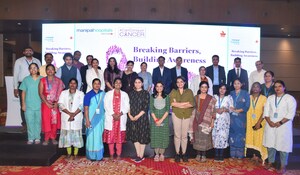Manipal Hospital Whitefield as A Center of Excellence Felicitates Organ Transplant Donors and Recipients
BANGALORE, India, Aug. 29, 2022 /PRNewswire/ -- Manipal Hospital Whitefield celebrated this World Organ Donation Week by felicitating organ donors and recipients at the hospital premises. As a quaternary care hospital, they organized an event to spread awareness about the noble cause of organ donation. The event was inaugurated by Mr. Arnab Mondal, Hospital Director along with Dr. Ravi Shankar B, Consultant - Nephrology, Dr. Sanjeev Rohatgi, Lead Consultant – HPB & Liver Transplant Surgery and Dr. Rajesh Mohan Shetty, Lead Consultant, Department of Critical Care Medicine, Chief of Clinical Services from Manipal Hospital Whitefield. The event was attended by four organ donors and recipients who were felicitated by our eminent doctors from the Nephrology, Surgical Gastroenterology/Liver team, and Intensive Care Unit team. The doctors spoke about the significance of organ donation and how it gives a lease of life to a person and a family, during the seminar.
Manipal Hospital Whitefield commenced the transplant program in the year 2019. Since its inception, the unit has done around 66 transplants, of which 50 were kidney transplants and 16 were liver transplants. In 2022 alone, the Whitefield unit has performed 26 transplants till date (including kidney and liver), out of which 18 were brain dead declaration (cadaver transplant) and 8 were live donor transplants.
Organ donation is an important act of kindness that can save 8 lives. It is estimated that globally end-stage kidney disease is associated with approximately 735,000 deaths annually. In India, it is estimated that about 220,000 people with end-stage kidney failure require kidney transplantation, against this approximately about 7500 kidney transplantations are performed at 250 kidney transplant centers in India. Of these, nearly 85 to 90% are living donors and 10to15% are deceased (cadaver) donor transplantations. The people who suffer from end-stage organ failure, kidney transplantation is a ray of hope to lead a normal and healthy life.
Usually, recipients of organ donation face a lot of challenges, as they need to face a lot of emotional battles and wait for the organs with the right match for a transplant. The demand for organs is more compared to donors as only 0.01% of Indians give consent to donate their organs after their death.
Dr. Ravi Shankar B, Consultant – Nephrologist, Manipal Hospital Whitefield, said, "Organ donation is a developing trend in this era and a noble gesture. It provides a life-saving opportunity for those who are at the end stage of organ failure. Unfortunately, the practice of organ donation is not followed on a large scale due to lack of awareness. Every day, many people die due to the unavailability of organs like kidneys, heart, pancreas, and many more. Keeping this in mind, we started this campaign to promote organ donation."
''There are 2 types of organ donation, living and cadaver organ donation. Though living kidney transplantation is more often performed in India, there is an increase in the number of people waiting for deceased (cadaver) kidney transplantation. The demand is more than the supply of deceased donor organs, therefore more awareness and campaign about deceased organ donation is crucial to meet the demand. However, it's noted that there is an increase in the trend of deceased donor organ donation since 2012, and more donations are happening in southern states of India. In the recent past, more awareness campaigns are conducted in Karnataka, and also noted that there is an increase in the number of organ donations during the last two years."
Dr. Sanjeev Rohatgi, Lead Consultant - HPB & Liver Transplant Surgery, Manipal Hospital Whitefield, said, "There are many precautionary measures taken while doing organ transplants. Preparations done for cadaver liver transplantation are very different from living-donor liver transplantation. For cadaver liver transplantation it takes around 6-8hours, where in for a living liver transplant it takes 10-12 hours to perform surgery, however, the time varies depending on the severity of the case. While harvesting an organ for transplantation, we follow many safety protocols. We also use a device called machine perfusion, which helps to maintain the liver at the optimal functioning while outside the body- this gives us more time and also helps in assessing organ quality."
Dr. Rajesh Mohan Shetty, Lead Consultant, Department of Critical Care Medicine, Chief of Clinical Services, Manipal Hospital Whitefield, said, "We have patients who are admitted to the hospital brain dead and their heart stops beating at a later stage. Death is inevitable, instead of letting go of a good organ it should be used to save a life by donating it. We have trained counselors who work with the family during such situations. The major challenge we face is the next of kin who are not forthcoming to give consent. Another obstacle is religion, as there is a certain misconception that certain religion forbids donating organs."
Photo: https://mma.prnewswire.com/media/1886873/World_Organ_Donation_Week.jpg
Photo: https://mma.prnewswire.com/media/1886874/Organ_Donors_and_Recipients_Felicitation.jpg






Share this article